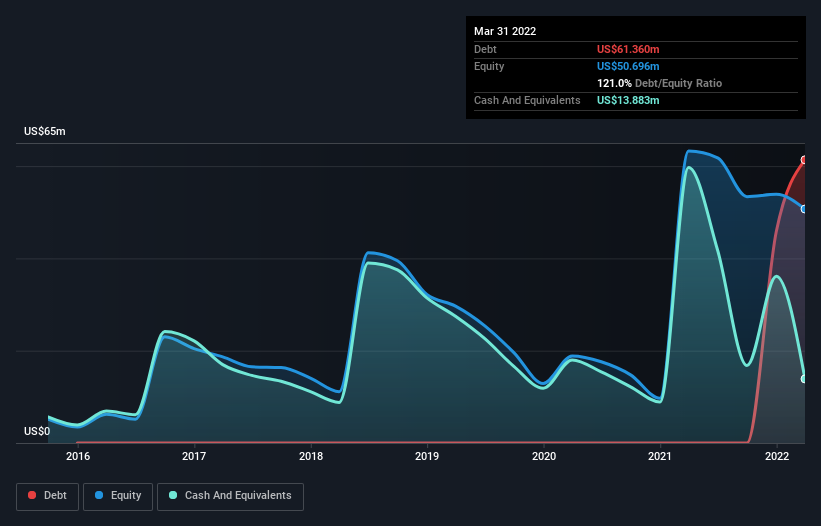
Howard Marks put it nicely when he said that, rather than worrying about share price volatility, 'The possibility of permanent loss is the risk I worry about... and every practical investor I know worries about.' When we think about how risky a company is, we always like to look at its use of debt, since debt overload can lead to ruin. We note that Orezone Gold Corporation (TSE:ORE) does have debt on its balance sheet. But is this debt a concern to shareholders?
What Risk Does Debt Bring?
Debt and other liabilities become risky for a business when it cannot easily fulfill those obligations, either with free cash flow or by raising capital at an attractive price. Part and parcel of capitalism is the process of 'creative destruction' where failed businesses are mercilessly liquidated by their bankers. However, a more frequent (but still costly) occurrence is where a company must issue shares at bargain-basement prices, permanently diluting shareholders, just to shore up its balance sheet. Having said that, the most common situation is where a company manages its debt reasonably well - and to its own advantage. When we think about a company's use of debt, we first look at cash and debt together.
See our latest analysis for Orezone Gold
What Is Orezone Gold's Debt?
As you can see below, at the end of March 2022, Orezone Gold had US$61.4m of debt, up from none a year ago. Click the image for more detail. However, it also had US$13.9m in cash, and so its net debt is US$47.5m.

A Look At Orezone Gold's Liabilities
The latest balance sheet data shows that Orezone Gold had liabilities of US$21.3m due within a year, and liabilities of US$90.6m falling due after that. On the other hand, it had cash of US$13.9m and US$313.4k worth of receivables due within a year. So its liabilities outweigh the sum of its cash and (near-term) receivables by US$97.7m.
While this might seem like a lot, it is not so bad since Orezone Gold has a market capitalization of US$321.3m, and so it could probably strengthen its balance sheet by raising capital if it needed to. But we definitely want to keep our eyes open to indications that its debt is bringing too much risk. There's no doubt that we learn most about debt from the balance sheet. But ultimately the future profitability of the business will decide if Orezone Gold can strengthen its balance sheet over time. So if you're focused on the future you can check out this free report showing analyst profit forecasts.
Since Orezone Gold has no significant operating revenue, shareholders probably hope it will develop a valuable new mine before too long.
Caveat Emptor
Over the last twelve months Orezone Gold produced an earnings before interest and tax (EBIT) loss. Indeed, it lost US$9.2m at the EBIT level. When we look at that and recall the liabilities on its balance sheet, relative to cash, it seems unwise to us for the company to have any debt. Quite frankly we think the balance sheet is far from match-fit, although it could be improved with time. Another cause for caution is that is bled US$117m in negative free cash flow over the last twelve months. So suffice it to say we consider the stock very risky. When analysing debt levels, the balance sheet is the obvious place to start. However, not all investment risk resides within the balance sheet - far from it. Be aware that Orezone Gold is showing 3 warning signs in our investment analysis , and 2 of those are concerning...
Of course, if you're the type of investor who prefers buying stocks without the burden of debt, then don't hesitate to discover our exclusive list of net cash growth stocks, today.
New: AI Stock Screener & Alerts
Our new AI Stock Screener scans the market every day to uncover opportunities.
• Dividend Powerhouses (3%+ Yield)
• Undervalued Small Caps with Insider Buying
• High growth Tech and AI Companies
Or build your own from over 50 metrics.
Have feedback on this article? Concerned about the content? Get in touch with us directly. Alternatively, email editorial-team (at) simplywallst.com.
This article by Simply Wall St is general in nature. We provide commentary based on historical data and analyst forecasts only using an unbiased methodology and our articles are not intended to be financial advice. It does not constitute a recommendation to buy or sell any stock, and does not take account of your objectives, or your financial situation. We aim to bring you long-term focused analysis driven by fundamental data. Note that our analysis may not factor in the latest price-sensitive company announcements or qualitative material. Simply Wall St has no position in any stocks mentioned.
About TSX:ORE
Orezone Gold
Engages in the mining, exploration, and development of gold properties.
Undervalued with high growth potential.
Similar Companies
Market Insights
Community Narratives




